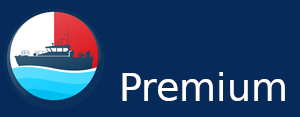During the course, six pilots from the pilot service and two VTS operators from the Vessel Traffic Service (VTS) complete exercises together, practising managing a range of situations from the everyday to the potentially critical.
Better cooperationThe pilot service and the Vessel Traffic Service are two of the most important maritime safety measures for the Norwegian coastline. By means of practical exercises in a simulator, the course provides pilots and VTS operators with an arena to train communication and cooperation under demanding conditions.
“This course builds increased understanding of each other’s tasks, and of the opportunities and limitations represented by each maritime safety measure,” says Kurt Haukeberg of the Norwegian Coastal Administration’s pilot service. “By becoming even better acquainted with each other’s procedures and ways of working, we can strengthen our cooperation. The more we practise together, the better the safety in Norwegian waters will be – and that’s the main objective of the course.”
Based on real-life incidentsThe course is based on a preliminary study from 2010 that investigated cooperation between pilots, bridge teams and the Vessel Traffic Service (VTS). The objective was to learn more about how cooperation can be improved by means of experiences and training based on real-life incidents.
“The result was a course description and a cooperation plan for pilots and VTS operators,” explains the Norwegian Coastal Administration’s Malin Dreijer. “We have already held this course for a number of years, but we are continuing to develop it. We have now run workshops with pilots, VTS operators, NCA course managers and instructors from Aboa Mare to identify common areas where cooperation is vital, as well as which procedures we should focus on during the exercises. The new agreement will enable participants to engage in preparatory work using an e-learning introduction and practical exercises in a simulator, and reflect together after the course on what has been learned. The incidents used will vary so that the participants always face new, real-life tasks.”
Extensive experience“We are proud to contribute to improved safety in Norwegian waters,” states Micael Vuorio, Head of Aboa Mare Ab. “By combining the experience we have gained from training Finnish pilots since the early 1990s, simulator training for deck officers and engineers since 2004 and VTS training since 2005, we are now able to develop a new course together with the Norwegian Coastal Administration. In this course, pilots and traffic managers undertake exercises together in a simulator, practising how to react optimally in critical situations.”


